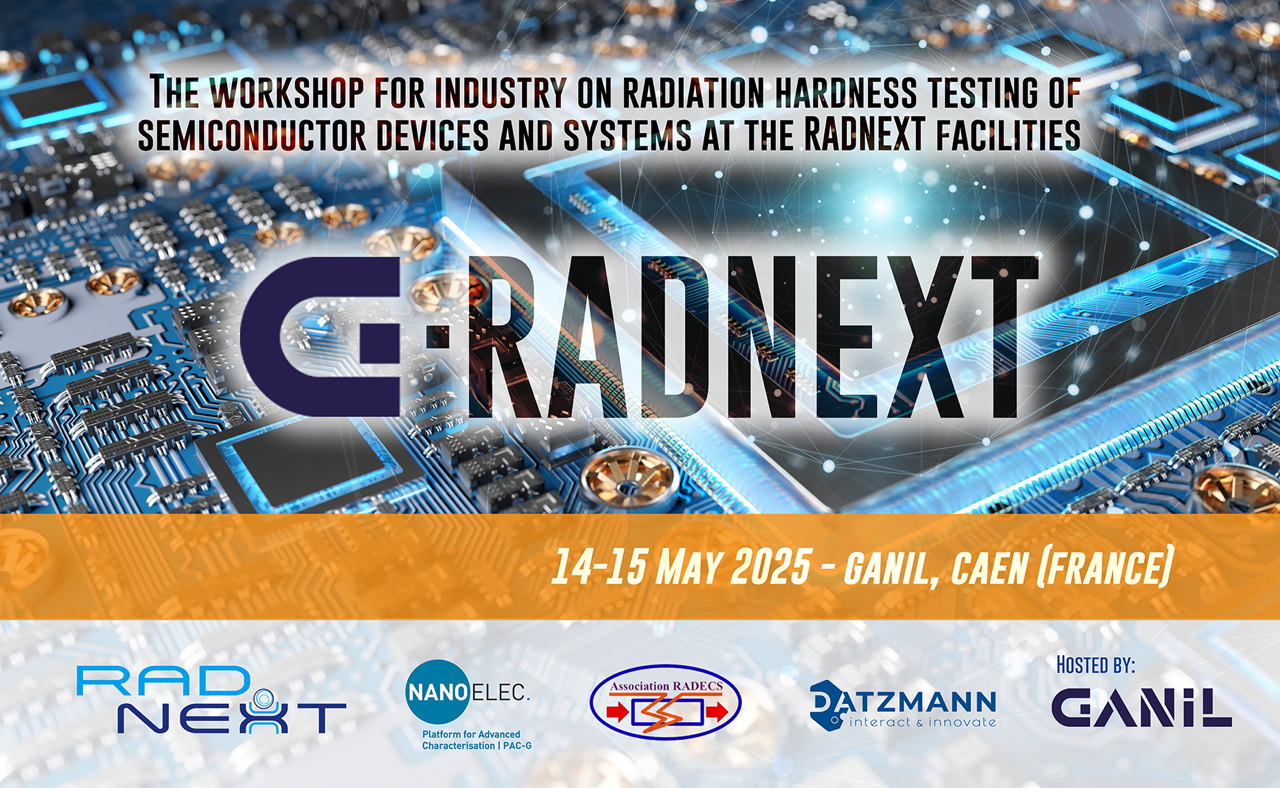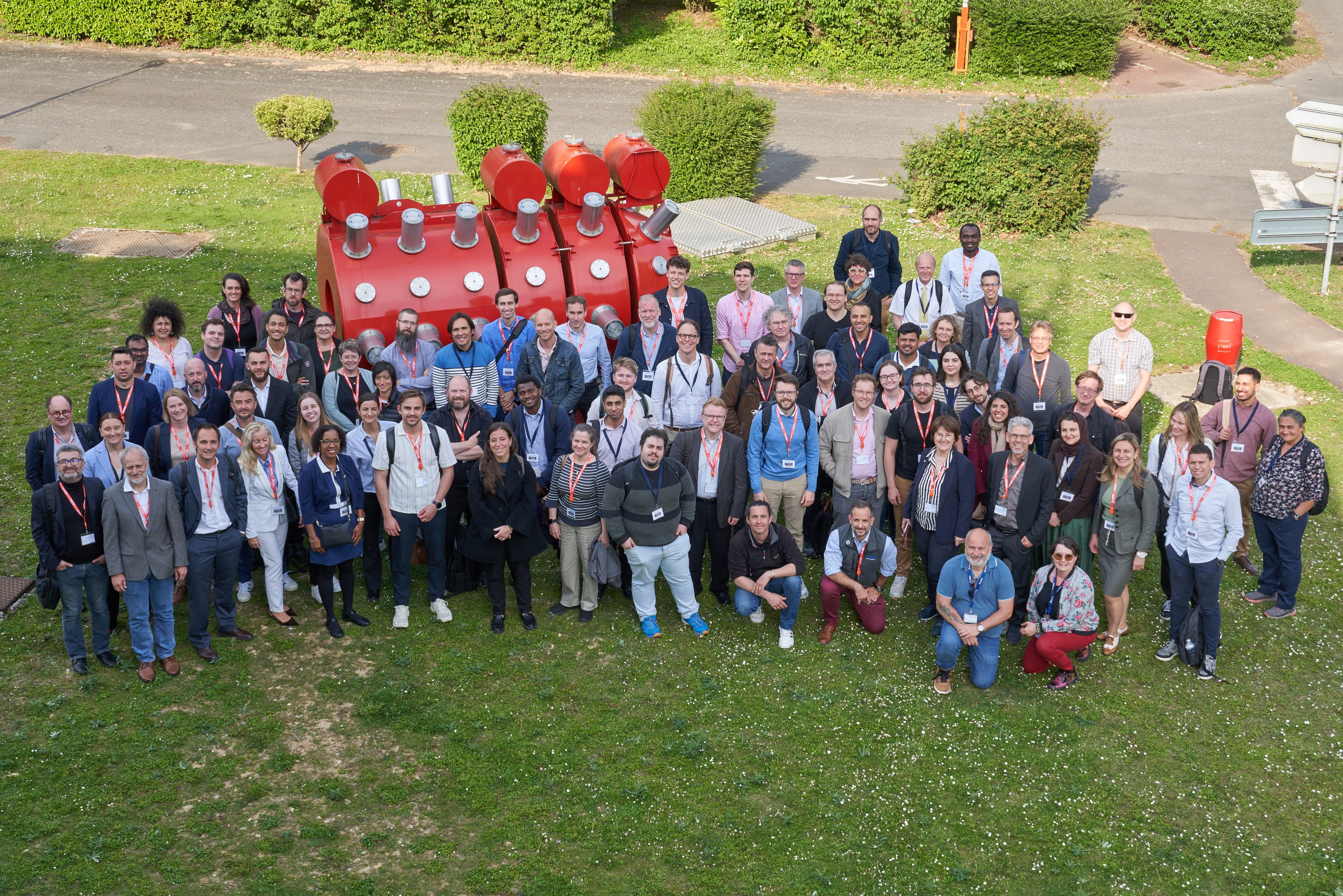
G-RADNEXT Workshop 2025
The Workshop for Industry on Radiation Hardness Testing of Semiconductor Devices and Systems at the RADNEXT Facilities
Date: May 14th and 15th, 2025
In-person event
Location: GANIL, Caen (France)
Organizers: RADNEXT, PAC-G (IRT nanoelec), RADECS association, GANIL, Datzmann interact & innovate
Workshop fee: The attendance is free of charge
Mandatory information to access GANIL: First name, Last Name, Date & Place of birth, Nationality

Description
Radiation effects in semiconductor devices have come to play a major role in the performance and reliability of today’s electronics. Several questions also arise from emerging applications (such as self-driving cars, nanosatellites, medical implants etc.). As the demand for radiation hardness testing is on the rise, the availability of radiation facilities providing industrial access to perform these tests at least for certain radiation types are not able to catch up with the increasing demand. Traditional testing methodologies also seem to be limited in face of new semiconductor technologies, the increased usage of commercial components of the shelf and new applications fields.
The RADNEXT program – an H2020 INFRAIA-02-2020 infrastructure project – started in June 2021 and is addressing most of these challenges. In particular, it aims at bridging the gap between industrial and academic users of radiation hardness testing and the irradiation facilities providing beam time to them. This workshop is primarily dedicated to the whole industrial community where radiation effects in semiconductor and other microelectronic devices play a crucial role: i.e. the chip designers, the foundries, space companies the end users, the testing companies and the testing equipment manufacturers and many more. The aim of the workshop is to connect the stakeholders from industry with radiation effects experts from academia and representatives from irradiation facilities to stimulate discussion, in the framework of the RADNEXT Initiative.
Building upon the experience, notably linked to the very positive outcome and feedback of the G-RAD workshop in December 2020, the G-RAD(NEXT) workshop in May 2022, the G-RADNEXT workshop 2023 at CERN and the GB-RADNEXT 2024 Workshop at RAL in the UK, we propose you to join us in May 2025 and continue from where we left last year. We are proud to announce that the workshop venue will be at GANIL in Caen, France.
Technical program
The technical program is available here.
Session 1 - Landscape of Irradiation Facilities in Europe (Session Chair: Alessandra Costantino)
Session 2 - From Industry for Industry (Session Chair: Philipp Bender)
Session 3 - System Level Testing (Session Chair: Matthew Gill)
Session 4 - Technology Scouting: A Selection of Academic Results from RADNEXT with Potential for Industry (Session Chair: Francoise Bezerra)
Session 5 - Alternative Approaches for Testing and Modelling Tools (Session Chair: Corinna Martinella)
Panel Discussion - 𝐑𝐚𝐝𝐢𝐚𝐭𝐢𝐨𝐧 𝐓𝐞𝐬𝐭𝐢𝐧𝐠 𝐆𝐮𝐢𝐝𝐞𝐥𝐢𝐧𝐞𝐬 𝐟𝐨𝐫 𝐒𝐩𝐚𝐜𝐞 𝐐𝐮𝐚𝐥𝐢𝐟𝐢𝐜𝐚𝐭𝐢𝐨𝐧 𝐨𝐟 𝐖𝐢𝐝𝐞 𝐁𝐚𝐧𝐝𝐠𝐚𝐩 𝐏𝐨𝐰𝐞𝐫 𝐃𝐞𝐯𝐢𝐜𝐞𝐬 (Chairs: Francesco Pintacuda, Corinna Martinella)
1st Keynote talk - Michael Campola (NASA) - Navigating Adaptive Radiation Hardness Assurance Approaches in a Changing Ecosystem
2nd Keynote talk - Dale McMorrow (U.S. Naval Research Laboratory) - Surrogate Test Approaches: Enabling Capabilities for Predictive Testing Using Pulsed Lasers and Other Methods
Social Program
-
A social dinner on Wednesday May 14th at 7.30 PM. The dinner will take place at Le Raphaël, 7 quai François Mitterand - Presqu'ile, 14000 Caen. www.le-raphael.com
- A site visit of the GANIL facility.
Objectives
G-RADNEXT 2025 aims to engage the industrial community with RADNEXT by proposing an event fully dedicated to industry with the following key objectives:
- The future of RADNEXT
- Collect needs, requirements and future trends from the industrial stakeholders
- Contribute to the development of the facility landscape
- Future perspectives from the application side (devices, test methods, etc.)
- Offer networking opportunities between industry, facility experts and other stakeholders in the field
Target audience
- Companies providing or using radiation testing services and consultancy
- Facilities and research infrastructures providing access to users in the field of radiation testing or intending to provide access in the near future
- Academics working in the field of radiation effects on semiconductors
- Organizations involved in the standardisation of testing methods and workflows
Desired Outcomes
Our goal is to increase the level of engagement from industry with the members of the RADNEXT consortium, with a growth of the industrial quota of transnational access and proprietary/confidential access. We want to better serve the industrial community, and in this way to create value for the European industry and increase the socio-economic impact of RADNEXT. Last but not least, we are striving for fostering the European non-dependency and competitiveness in the field of radiation effects and radiation hardness assurance on electronic and microelectronic devices.
Organizers
The workshop is organised in collaboration between the Platform for Advanced Characterisation (PAC-G), the RADECS association, RADNEXT, Datzmann interact & innovate and the GANIL as the workshop host.
RADNEXT is the first distributed research infrastructure for the irradiation community to offer EU-funded Transnational Access (TA) for precompetitive and publishable research activities for industry and academia. It is an initiative recently funded in the context of the Horizon 2020 programme connecting more than 30 partners across Europe and beyond (through TRIUMF’s participation), including most of the major facilities providing active in the domain of irradiation.
PAC-G, the Platform for Advanced Characterisation – Grenoble is a service platform dedicated to the characterisation in micro and nanoelectronics developed in Grenoble in the context of the IRT Nanoelec. This platform propose commercial confidential access to advanced synchrotron X-rays and neutrons end-stations available at the ESRF, the ILL and the LPSC to support the industry of semiconductors. PAC-G is very active in the domain of failure analysis and physical or chemical characterisation and since 2016 launched a programme in the domain of the radiation hardness testing.
The RADECS association, created in 1992, aims to promote basic and applied science and research in the field of radiation and its effects on materials, components and systems for space and ground level applications. RADECS association holds the annual RADECS European Conference and occasional RADECS workshops. It promotes research activities, scientific publications, co-operation and exchange with other relevant organisations on radiation effects.
GANIL the Grand Accélérateur National d'Ions Lourds, is located on the Jules Horowitz campus in Caen, Normandy. It is a major facility serving French, European and international research. It employs around 290 physicists, engineers and technicians from the CEA (Commissariat à l'Energie Atomique et aux Energies Alternatives) and the CNRS (Centre National de la Recherche Scientifique), plus several hundred researchers and students who regularly come from all over the world to carry out experiments in the fields of fundamental and applied research.
GANIL is one of the world's leading laboratories for research using ion beams. Its areas of research include nuclear physics and astrophysics, molecular collisions and the interstellar medium, materials under irradiation and nanostructuring, radiobiology and innovative techniques for medical imaging and hadrontherapy.
DATZMANN interact & innovate is providing a portfolio of services centering on accelerator applications and is located in Munich, Germany. Our technical core expertise is in the field of radiations hardness testing, proton therapy for cancer treatments and material charactrisation with ion beams. Our mission is bridging the gap between science and industry, strengthening the bonds and enforcing technology transfer and innovation. In this context we are conducting studies and surveys on the cooperation between science and business. We perform and support outreach and dissemination activities for the RADNEXT project. Furthermore we organize workshops with a dedicated focus on industry. In addition we are providing various consulting services for academia, public institutions and industry in particular for radiations hardness testing projects.
Committees
Steering committee
Ennio Capria – ESRF - Chair
Gerd Datzmann - Datzmann interact & innovate – Organisation chair
Ruben Garcia Alia - CERN - RADNEXT
Françoise Bezerra - CNES - RADECS
Eloïse Dessay - GANIL
Industrial and scientific committee
IAP RADNEXT
Renaud Mangeret - Airbus Defence and Space – Chair
Magali Haussy - Thales Alenia Space in Belgium
Christian Chatry - TRAD
Jens Verbeeck - MAGICS Instruments NV
Tudor Chirila - Infineon Technologies AG
Gerald Soelkner - Infineon Technologies
Philippe Roche - STMicroelectronics
Gilles Gasiot - STMicroelectronics
Pierre Xiao Wang - 3D PLUS
Gonzalo Fernández Romero - ALTER Technology
SAP RADNEXT
Paavo Heiskanen - ESA/ESTEC
Véronique Ferlet-Cavrois - ESA/ESTEC
Jonathan Pellish - NASA
Philippe Paillet - CEA
Maria Teresa Alvarez - National Institute for Aerospace Technology (INTA)
Jan Budroweit - German Aerospace Center (DLR)
Damien Lambert - CEA
Michael J. Campola – NASA
Organisation team
Gerd Datzmann – Datzmann interact & innovate – Organisation chair
Eloïse Dessay - GANIL - Local organisation coordinator
Stéphanie Pupin - GANIL - Local organisation
Sebastien Gautrot - GANIL - Local organisation
Pablo Federico Lopez – CERN – Organisation coordinator
Cloe Levointurier-Vajda – CERN – Organisation support
Sabrina El Yacoubi – CERN – Organisation support
Inaam Ul Haq – ESRF – Communication support coordinator
Hanne Stas – KULeuven – Communication support
Ygor Aguiar – CERN – Communication support
Sabrina Balghouthi - ESRF - Communication support